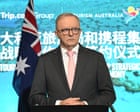
The latest developments in international affairs reveal a tapestry of diplomatic maneuvers and evolving partnerships across the globe. As nations navigate complex issues ranging from regional security to statehood declarations, the world watches with hopeful anticipation.
In the Indo-Pacific region, Australia stands firm in its approach to potential conflicts involving superpower tensions. Reports suggest that the United States has sought commitments from Canberra regarding a hypothetical conflict scenario involving China and Taiwan. However, Australian officials, including Prime Minister Anthony Albanese and Defence Industry Minister Pat Conroy, have resisted making advanced commitments. Albania reiterated Australia’s desire for a peaceful and secure Indo-Pacific, a sentiment underscored by his reference to the U.S.’s own “strategic ambiguity” regarding Taiwan. By maintaining this stance, Australia emphasizes its commitment to regional stability without prematurely entangling itself in potential conflicts.
Meanwhile, in a remarkable development for its overseas territories, France has reached a “historic” agreement with New Caledonia. This accord, celebrated by French President Emmanuel Macron as a “new chapter,” will see New Caledonia recognized as a new state while remaining part of the French Republic. This agreement follows a series of long negotiations aimed at resolving tension caused by previous separatist movements. The move represents a significant step towards ensuring peace and trust within the territory, echoing France’s commitment to enhancing autonomy and resolving conflicts through dialogue.
Elsewhere, the path to peace in the Middle East remains intricate, with a United Nations summit on a two-state solution for Israel and Palestine set to resume at the end of July. However, it is noteworthy that French President Emmanuel Macron, who has been a vocal advocate for the two-state solution, might not be attending the summit. His absence could impact the prospects for significant diplomatic progress and recognitions of Palestinian statehood. Despite this, Macron has consistently stated that the establishment of two states is essential for enduring peace and stability in the region. The current intricacies of ceasefire negotiations between Hamas and Israel continue to add layers of complexity to the proposal.
Adding to the multifaceted dialogue on international trade, Taiwan is engaged in critical tariff negotiations with the United States. As the deadline for an agreement approaches, Taiwanese leadership is diligently working to conclude discussions positively. The vice-premier of Taiwan has indicated that the talks have reached a “key phase,” highlighting the critical nature of these discussions for both trade relations and economic cooperation between the two nations.
As the global community observes these developments, the delicate balance of diplomacy, trade, and regional security continues to shape the landscape of international relations. Each of these stories reflects notable progress and the constant pursuit of peaceful resolutions in a world where cooperation remains paramount.
Source: {link}
